Cultural Diversity in Venezuelan Workplace: A Report
VerifiedAdded on 2021/09/29
|6
|1250
|132
Report
AI Summary
This report delves into the cultural diversity of Venezuela, examining its impact on the workplace and healthcare. It explores key cultural elements including health beliefs and practices, family patterns, communication styles, and death and dying practices. The report highlights the challenges and complexities of managing a diverse workforce in Venezuela, emphasizing the importance of understanding cultural nuances to provide effective healthcare and foster a harmonious work environment. It references various academic sources to support its analysis, offering insights into the country's unique cultural landscape and its implications for both domestic and international health administration. The report concludes by emphasizing the need to consider cultural factors such as family values and religious beliefs when managing health activities in Venezuela, recognizing potential issues like discrimination and nepotism.
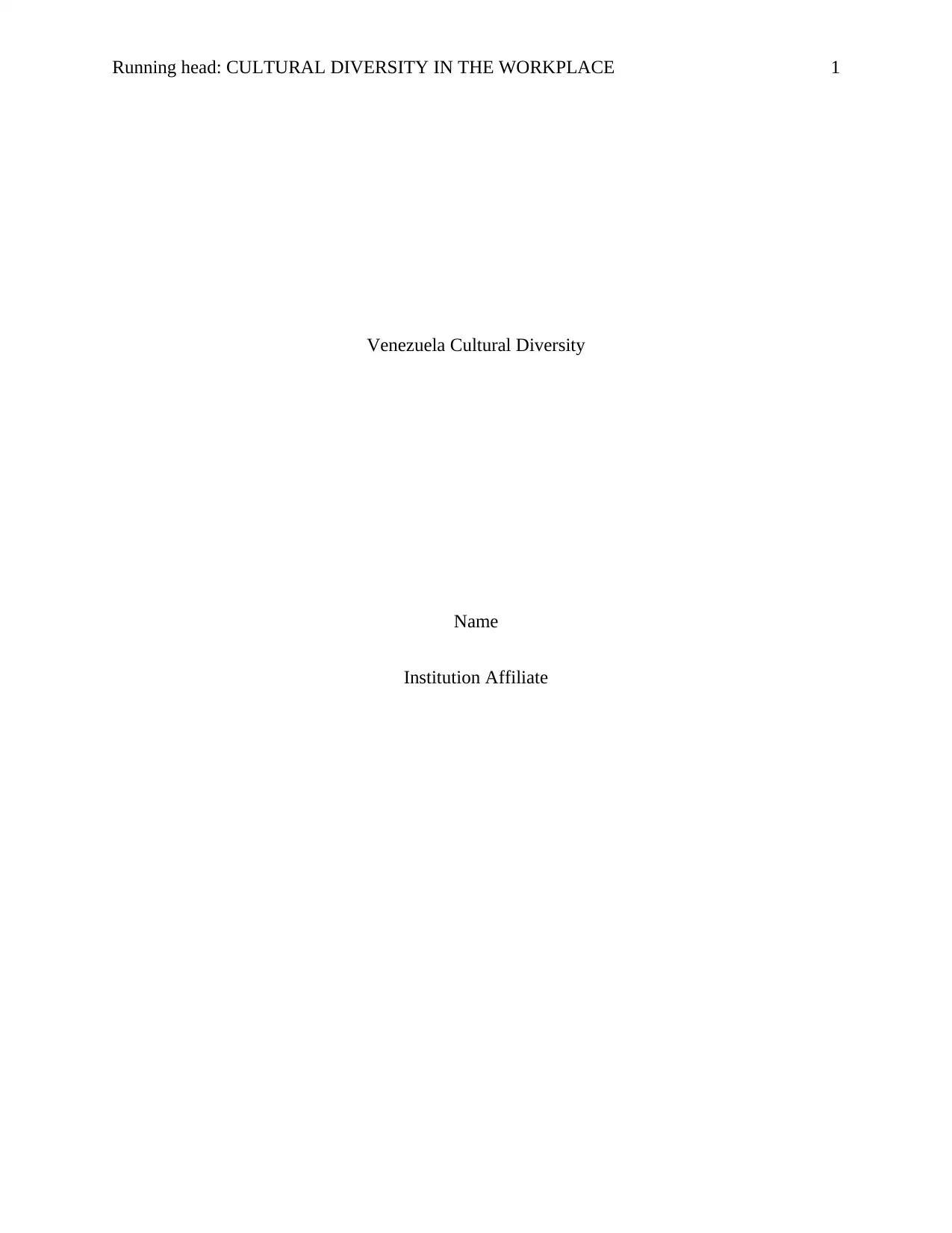
Running head: CULTURAL DIVERSITY IN THE WORKPLACE 1
Venezuela Cultural Diversity
Name
Institution Affiliate
Venezuela Cultural Diversity
Name
Institution Affiliate
Paraphrase This Document
Need a fresh take? Get an instant paraphrase of this document with our AI Paraphraser
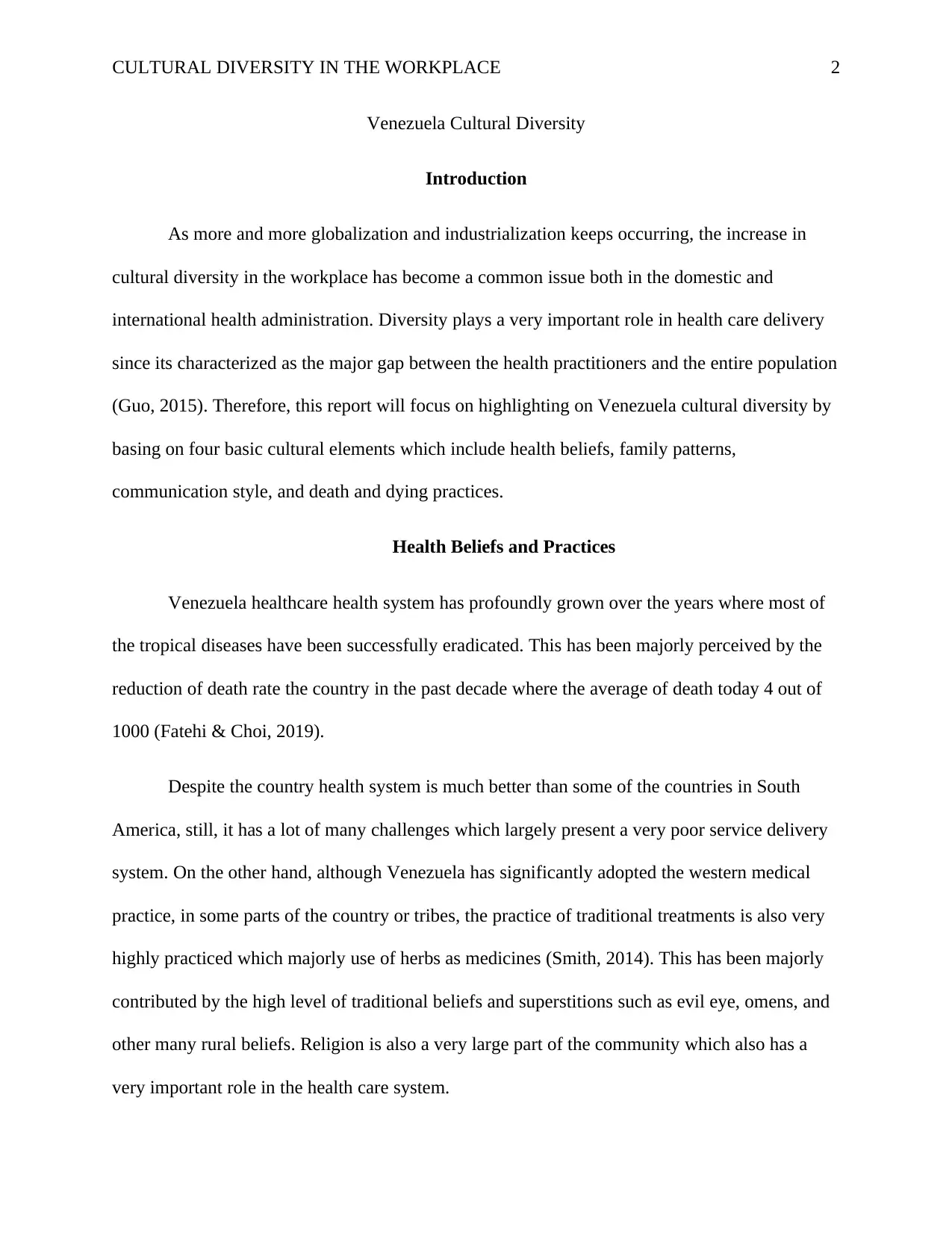
CULTURAL DIVERSITY IN THE WORKPLACE 2
Venezuela Cultural Diversity
Introduction
As more and more globalization and industrialization keeps occurring, the increase in
cultural diversity in the workplace has become a common issue both in the domestic and
international health administration. Diversity plays a very important role in health care delivery
since its characterized as the major gap between the health practitioners and the entire population
(Guo, 2015). Therefore, this report will focus on highlighting on Venezuela cultural diversity by
basing on four basic cultural elements which include health beliefs, family patterns,
communication style, and death and dying practices.
Health Beliefs and Practices
Venezuela healthcare health system has profoundly grown over the years where most of
the tropical diseases have been successfully eradicated. This has been majorly perceived by the
reduction of death rate the country in the past decade where the average of death today 4 out of
1000 (Fatehi & Choi, 2019).
Despite the country health system is much better than some of the countries in South
America, still, it has a lot of many challenges which largely present a very poor service delivery
system. On the other hand, although Venezuela has significantly adopted the western medical
practice, in some parts of the country or tribes, the practice of traditional treatments is also very
highly practiced which majorly use of herbs as medicines (Smith, 2014). This has been majorly
contributed by the high level of traditional beliefs and superstitions such as evil eye, omens, and
other many rural beliefs. Religion is also a very large part of the community which also has a
very important role in the health care system.
Venezuela Cultural Diversity
Introduction
As more and more globalization and industrialization keeps occurring, the increase in
cultural diversity in the workplace has become a common issue both in the domestic and
international health administration. Diversity plays a very important role in health care delivery
since its characterized as the major gap between the health practitioners and the entire population
(Guo, 2015). Therefore, this report will focus on highlighting on Venezuela cultural diversity by
basing on four basic cultural elements which include health beliefs, family patterns,
communication style, and death and dying practices.
Health Beliefs and Practices
Venezuela healthcare health system has profoundly grown over the years where most of
the tropical diseases have been successfully eradicated. This has been majorly perceived by the
reduction of death rate the country in the past decade where the average of death today 4 out of
1000 (Fatehi & Choi, 2019).
Despite the country health system is much better than some of the countries in South
America, still, it has a lot of many challenges which largely present a very poor service delivery
system. On the other hand, although Venezuela has significantly adopted the western medical
practice, in some parts of the country or tribes, the practice of traditional treatments is also very
highly practiced which majorly use of herbs as medicines (Smith, 2014). This has been majorly
contributed by the high level of traditional beliefs and superstitions such as evil eye, omens, and
other many rural beliefs. Religion is also a very large part of the community which also has a
very important role in the health care system.
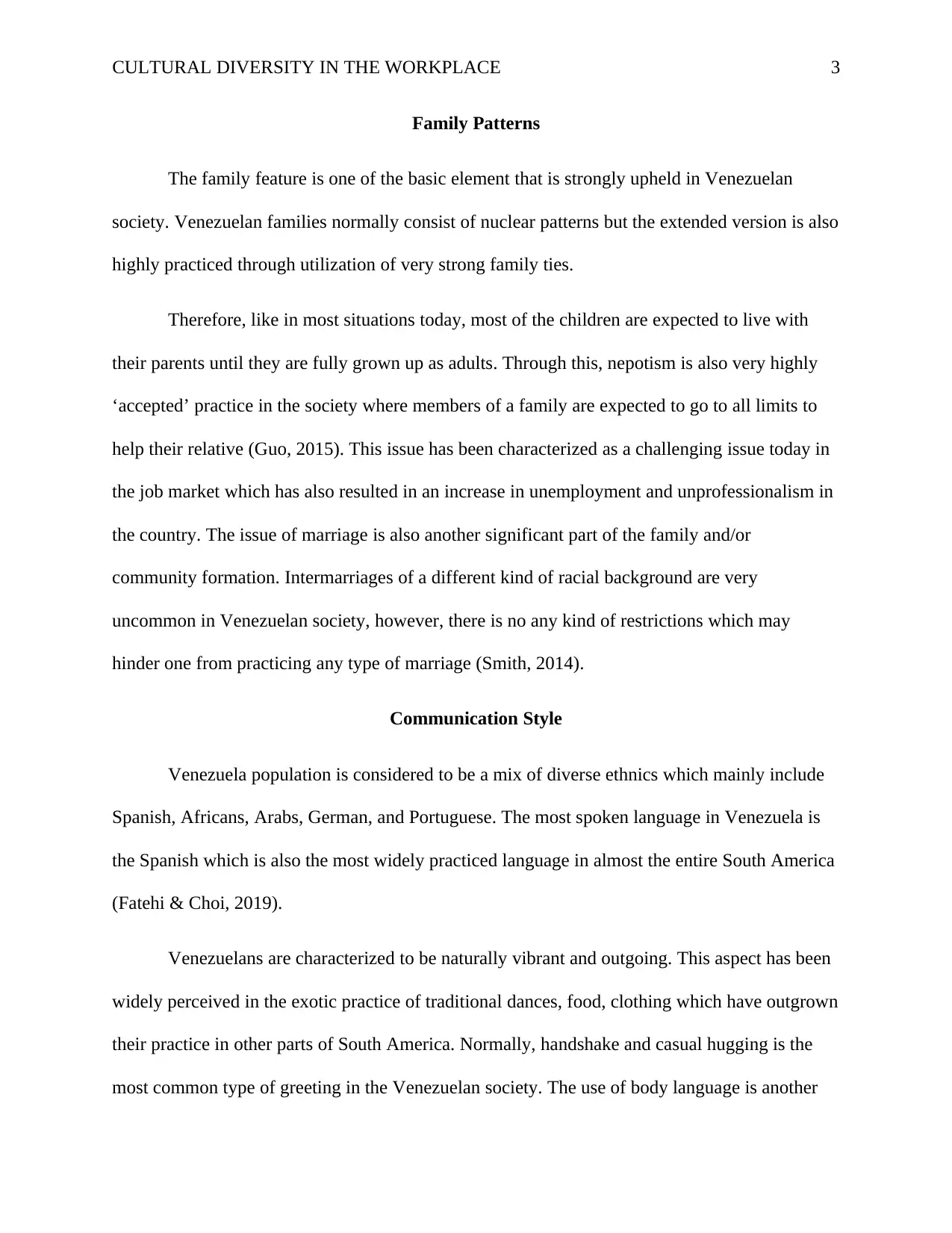
CULTURAL DIVERSITY IN THE WORKPLACE 3
Family Patterns
The family feature is one of the basic element that is strongly upheld in Venezuelan
society. Venezuelan families normally consist of nuclear patterns but the extended version is also
highly practiced through utilization of very strong family ties.
Therefore, like in most situations today, most of the children are expected to live with
their parents until they are fully grown up as adults. Through this, nepotism is also very highly
‘accepted’ practice in the society where members of a family are expected to go to all limits to
help their relative (Guo, 2015). This issue has been characterized as a challenging issue today in
the job market which has also resulted in an increase in unemployment and unprofessionalism in
the country. The issue of marriage is also another significant part of the family and/or
community formation. Intermarriages of a different kind of racial background are very
uncommon in Venezuelan society, however, there is no any kind of restrictions which may
hinder one from practicing any type of marriage (Smith, 2014).
Communication Style
Venezuela population is considered to be a mix of diverse ethnics which mainly include
Spanish, Africans, Arabs, German, and Portuguese. The most spoken language in Venezuela is
the Spanish which is also the most widely practiced language in almost the entire South America
(Fatehi & Choi, 2019).
Venezuelans are characterized to be naturally vibrant and outgoing. This aspect has been
widely perceived in the exotic practice of traditional dances, food, clothing which have outgrown
their practice in other parts of South America. Normally, handshake and casual hugging is the
most common type of greeting in the Venezuelan society. The use of body language is another
Family Patterns
The family feature is one of the basic element that is strongly upheld in Venezuelan
society. Venezuelan families normally consist of nuclear patterns but the extended version is also
highly practiced through utilization of very strong family ties.
Therefore, like in most situations today, most of the children are expected to live with
their parents until they are fully grown up as adults. Through this, nepotism is also very highly
‘accepted’ practice in the society where members of a family are expected to go to all limits to
help their relative (Guo, 2015). This issue has been characterized as a challenging issue today in
the job market which has also resulted in an increase in unemployment and unprofessionalism in
the country. The issue of marriage is also another significant part of the family and/or
community formation. Intermarriages of a different kind of racial background are very
uncommon in Venezuelan society, however, there is no any kind of restrictions which may
hinder one from practicing any type of marriage (Smith, 2014).
Communication Style
Venezuela population is considered to be a mix of diverse ethnics which mainly include
Spanish, Africans, Arabs, German, and Portuguese. The most spoken language in Venezuela is
the Spanish which is also the most widely practiced language in almost the entire South America
(Fatehi & Choi, 2019).
Venezuelans are characterized to be naturally vibrant and outgoing. This aspect has been
widely perceived in the exotic practice of traditional dances, food, clothing which have outgrown
their practice in other parts of South America. Normally, handshake and casual hugging is the
most common type of greeting in the Venezuelan society. The use of body language is another
⊘ This is a preview!⊘
Do you want full access?
Subscribe today to unlock all pages.

Trusted by 1+ million students worldwide
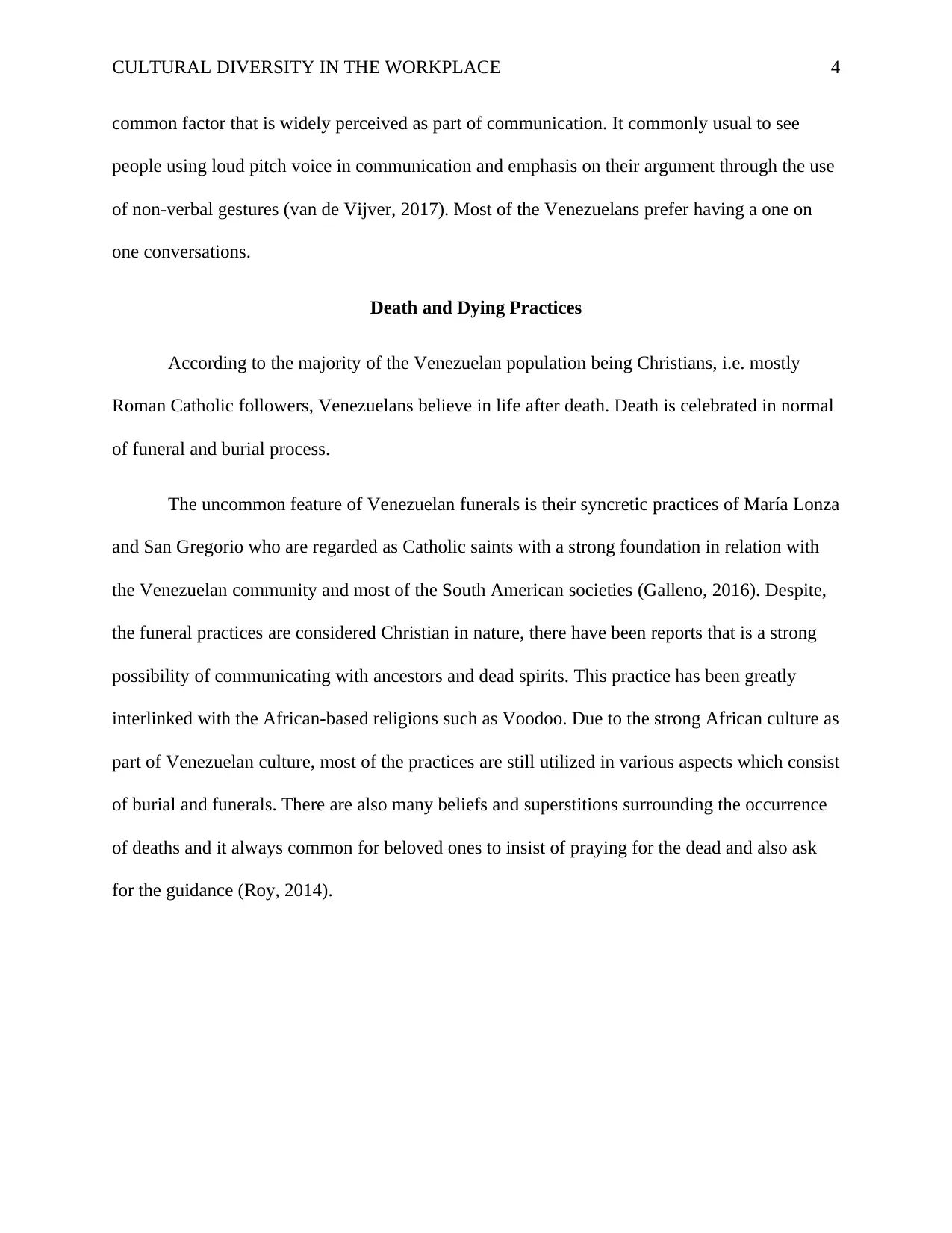
CULTURAL DIVERSITY IN THE WORKPLACE 4
common factor that is widely perceived as part of communication. It commonly usual to see
people using loud pitch voice in communication and emphasis on their argument through the use
of non-verbal gestures (van de Vijver, 2017). Most of the Venezuelans prefer having a one on
one conversations.
Death and Dying Practices
According to the majority of the Venezuelan population being Christians, i.e. mostly
Roman Catholic followers, Venezuelans believe in life after death. Death is celebrated in normal
of funeral and burial process.
The uncommon feature of Venezuelan funerals is their syncretic practices of María Lonza
and San Gregorio who are regarded as Catholic saints with a strong foundation in relation with
the Venezuelan community and most of the South American societies (Galleno, 2016). Despite,
the funeral practices are considered Christian in nature, there have been reports that is a strong
possibility of communicating with ancestors and dead spirits. This practice has been greatly
interlinked with the African-based religions such as Voodoo. Due to the strong African culture as
part of Venezuelan culture, most of the practices are still utilized in various aspects which consist
of burial and funerals. There are also many beliefs and superstitions surrounding the occurrence
of deaths and it always common for beloved ones to insist of praying for the dead and also ask
for the guidance (Roy, 2014).
common factor that is widely perceived as part of communication. It commonly usual to see
people using loud pitch voice in communication and emphasis on their argument through the use
of non-verbal gestures (van de Vijver, 2017). Most of the Venezuelans prefer having a one on
one conversations.
Death and Dying Practices
According to the majority of the Venezuelan population being Christians, i.e. mostly
Roman Catholic followers, Venezuelans believe in life after death. Death is celebrated in normal
of funeral and burial process.
The uncommon feature of Venezuelan funerals is their syncretic practices of María Lonza
and San Gregorio who are regarded as Catholic saints with a strong foundation in relation with
the Venezuelan community and most of the South American societies (Galleno, 2016). Despite,
the funeral practices are considered Christian in nature, there have been reports that is a strong
possibility of communicating with ancestors and dead spirits. This practice has been greatly
interlinked with the African-based religions such as Voodoo. Due to the strong African culture as
part of Venezuelan culture, most of the practices are still utilized in various aspects which consist
of burial and funerals. There are also many beliefs and superstitions surrounding the occurrence
of deaths and it always common for beloved ones to insist of praying for the dead and also ask
for the guidance (Roy, 2014).
Paraphrase This Document
Need a fresh take? Get an instant paraphrase of this document with our AI Paraphraser
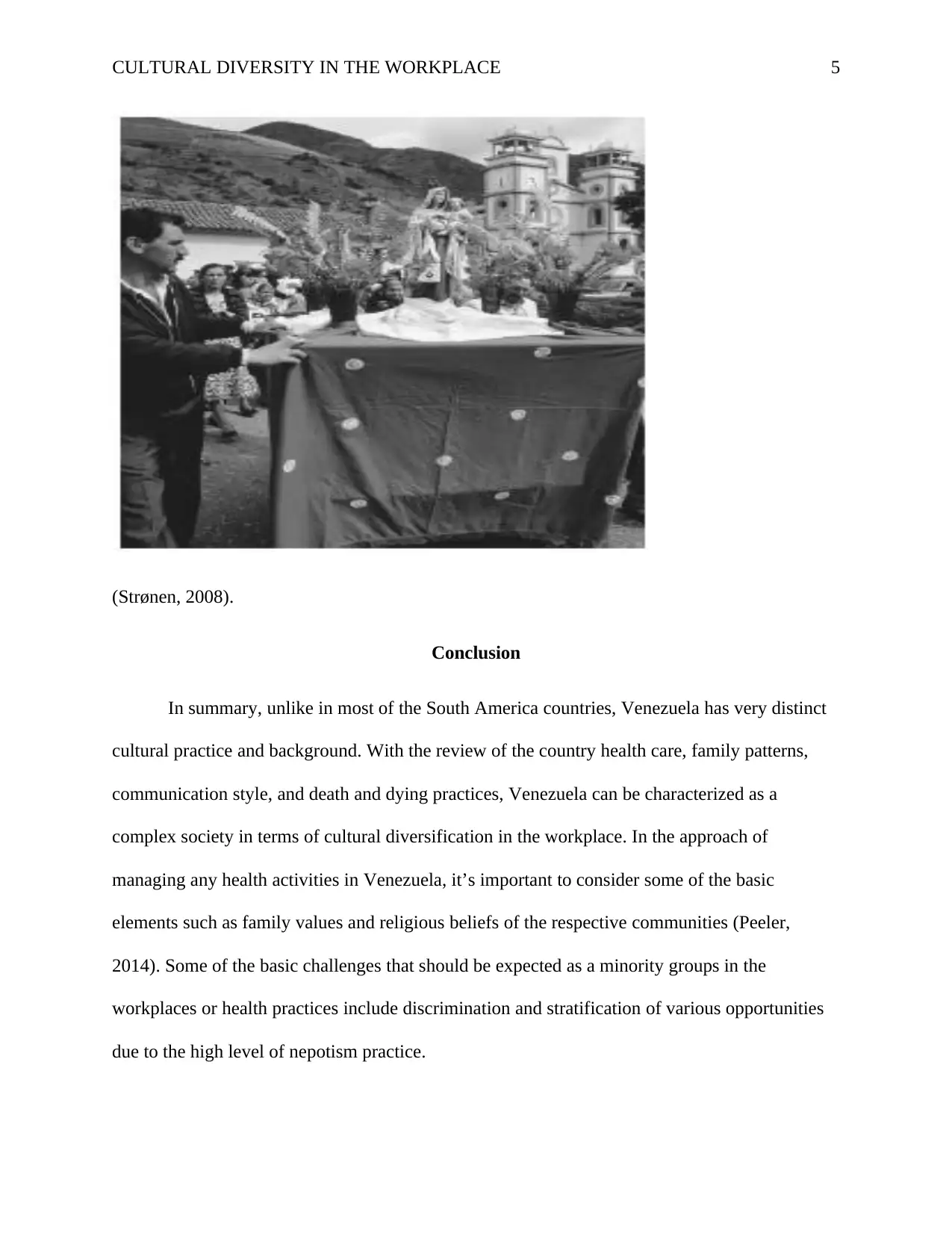
CULTURAL DIVERSITY IN THE WORKPLACE 5
(Strønen, 2008).
Conclusion
In summary, unlike in most of the South America countries, Venezuela has very distinct
cultural practice and background. With the review of the country health care, family patterns,
communication style, and death and dying practices, Venezuela can be characterized as a
complex society in terms of cultural diversification in the workplace. In the approach of
managing any health activities in Venezuela, it’s important to consider some of the basic
elements such as family values and religious beliefs of the respective communities (Peeler,
2014). Some of the basic challenges that should be expected as a minority groups in the
workplaces or health practices include discrimination and stratification of various opportunities
due to the high level of nepotism practice.
(Strønen, 2008).
Conclusion
In summary, unlike in most of the South America countries, Venezuela has very distinct
cultural practice and background. With the review of the country health care, family patterns,
communication style, and death and dying practices, Venezuela can be characterized as a
complex society in terms of cultural diversification in the workplace. In the approach of
managing any health activities in Venezuela, it’s important to consider some of the basic
elements such as family values and religious beliefs of the respective communities (Peeler,
2014). Some of the basic challenges that should be expected as a minority groups in the
workplaces or health practices include discrimination and stratification of various opportunities
due to the high level of nepotism practice.
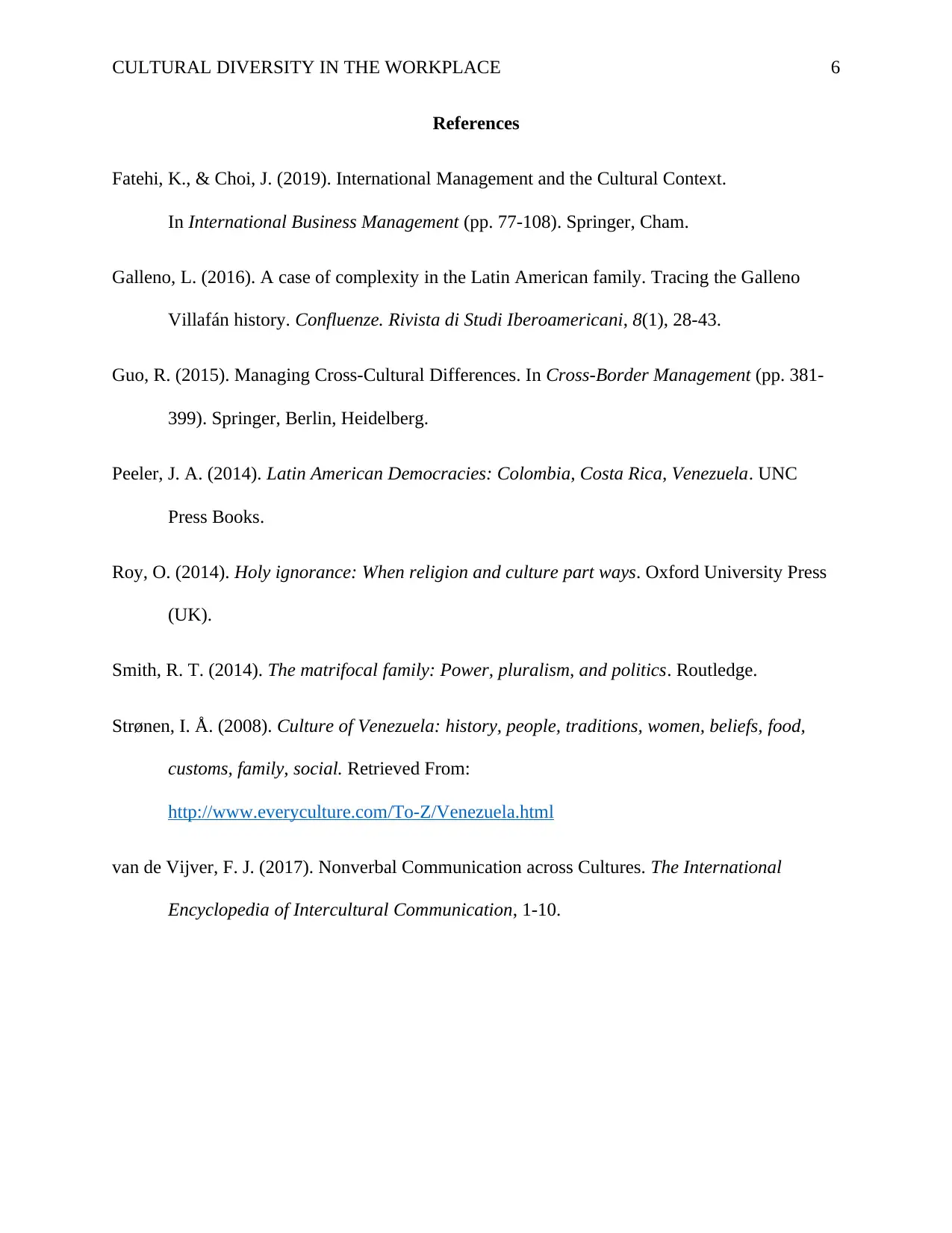
CULTURAL DIVERSITY IN THE WORKPLACE 6
References
Fatehi, K., & Choi, J. (2019). International Management and the Cultural Context.
In International Business Management (pp. 77-108). Springer, Cham.
Galleno, L. (2016). A case of complexity in the Latin American family. Tracing the Galleno
Villafán history. Confluenze. Rivista di Studi Iberoamericani, 8(1), 28-43.
Guo, R. (2015). Managing Cross-Cultural Differences. In Cross-Border Management (pp. 381-
399). Springer, Berlin, Heidelberg.
Peeler, J. A. (2014). Latin American Democracies: Colombia, Costa Rica, Venezuela. UNC
Press Books.
Roy, O. (2014). Holy ignorance: When religion and culture part ways. Oxford University Press
(UK).
Smith, R. T. (2014). The matrifocal family: Power, pluralism, and politics. Routledge.
Strønen, I. Å. (2008). Culture of Venezuela: history, people, traditions, women, beliefs, food,
customs, family, social. Retrieved From:
http://www.everyculture.com/To-Z/Venezuela.html
van de Vijver, F. J. (2017). Nonverbal Communication across Cultures. The International
Encyclopedia of Intercultural Communication, 1-10.
References
Fatehi, K., & Choi, J. (2019). International Management and the Cultural Context.
In International Business Management (pp. 77-108). Springer, Cham.
Galleno, L. (2016). A case of complexity in the Latin American family. Tracing the Galleno
Villafán history. Confluenze. Rivista di Studi Iberoamericani, 8(1), 28-43.
Guo, R. (2015). Managing Cross-Cultural Differences. In Cross-Border Management (pp. 381-
399). Springer, Berlin, Heidelberg.
Peeler, J. A. (2014). Latin American Democracies: Colombia, Costa Rica, Venezuela. UNC
Press Books.
Roy, O. (2014). Holy ignorance: When religion and culture part ways. Oxford University Press
(UK).
Smith, R. T. (2014). The matrifocal family: Power, pluralism, and politics. Routledge.
Strønen, I. Å. (2008). Culture of Venezuela: history, people, traditions, women, beliefs, food,
customs, family, social. Retrieved From:
http://www.everyculture.com/To-Z/Venezuela.html
van de Vijver, F. J. (2017). Nonverbal Communication across Cultures. The International
Encyclopedia of Intercultural Communication, 1-10.
⊘ This is a preview!⊘
Do you want full access?
Subscribe today to unlock all pages.

Trusted by 1+ million students worldwide
1 out of 6
Related Documents
Your All-in-One AI-Powered Toolkit for Academic Success.
+13062052269
info@desklib.com
Available 24*7 on WhatsApp / Email
![[object Object]](/_next/static/media/star-bottom.7253800d.svg)
Unlock your academic potential
Copyright © 2020–2026 A2Z Services. All Rights Reserved. Developed and managed by ZUCOL.





